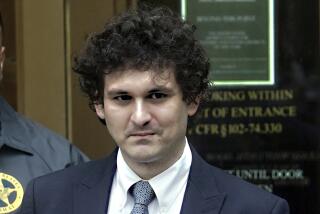SEC too focused on bringing high volume of cases, inspector general says
- Share via
Reporting from Washington —
The Securities and Exchange Commission is still focused too much on the number of cases it has brought and not enough on the number of investors protected, the agency’s inspector general said Wednesday at a hearing looking into the commission’s failure to identify quickly an alleged $8-billion fraud scheme involving Robert Allen Stanford and Stanford Financial Group.
“You have to value the clear harm to investors over potential litigation risk,” said H. David Kotz, inspector general of the SEC, at a Senate Banking Committee hearing on the alleged Stanford scheme. “The SEC has made some changes, but we’d like it to be even more clear in their procedures that the number of investors harmed is the most important consideration.”
The SEC has been under intense pressure in recent years for failing to identify the alleged Stanford scheme and an estimated $65-billion Ponzi scheme perpetrated by Bernard L. Madoff in a timely manner.
A 2009 SEC suit alleges Stanford and three of his companies defrauded investors in a scheme involving certificates of deposit. Kotz pointed out that the SEC’s Washington examination staff identified strong evidence of fraud in 2007 and that the regional SEC office in
Fort Worth had been aware since 1997 that Stanford might be conducting a Ponzi scheme. But no SEC action took place until 12 years later.
Kotz argued that during the previous decades the Fort Worth office operated within a broader SEC culture where novel and complex cases such as the suspected Stanford scheme were not encouraged because officials were evaluated by the number of cases they brought. Instead, Kotz said, staff were focused on bringing a number of “quick hit” smaller cases to make their offices appear to be more successful than other offices. He added that even if the intention is there to change that attitude at the SEC, he is not sure staff members know that statistics are not important.
“We need to make sure that the idea that stats are not important trickles all the way down the line,” he said.
But Robert Khuzami, director of the SEC’s enforcement division, argued that he is sending a clear message to the agency’s staff that “quick hit” small cases should not be given more attention than bigger cases. He pointed out that the agency has brought major, complex cases against large companies including Dell Inc., Citigroup Inc. and Goldman Sachs Group Inc. as well as WorldCom and Enron. In July, Dell, Citigroup and Goldman settled separately with the SEC on various charges, paying $75 million to $550 million each.
“We are not getting quick stats on those cases,” Khuzami said. “[Quick hits] are not the standard today, I assure you.”
He argued that the shortcoming at the agency occurred in the Stanford case because the agency didn’t respond as creatively as it could.
Lawmakers also expressed concern about the agency’s handling of the Stanford case. Senate Banking Committee Chairman Christopher J. Dodd (D-Conn.), argued that the SEC finally took action in the Stanford case only after Madoff’s Ponzi scheme was exposed.
“Both cases revealed deeply troubling issues at the SEC,” Dodd said.
“We seem to have an instance in which one side of the agency was screaming that there was a fire, and the other side said that the fire was too hard to put out or not a fire at all,” he said.
Orol writes for MarketWatch.com/McClatchy
More to Read
Inside the business of entertainment
The Wide Shot brings you news, analysis and insights on everything from streaming wars to production — and what it all means for the future.
You may occasionally receive promotional content from the Los Angeles Times.










